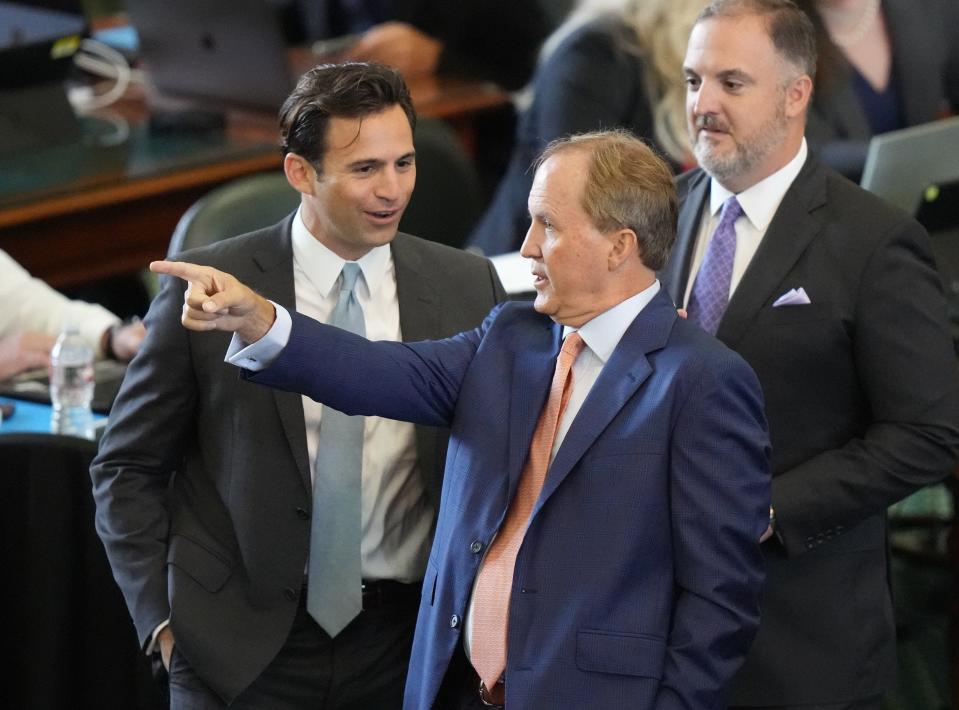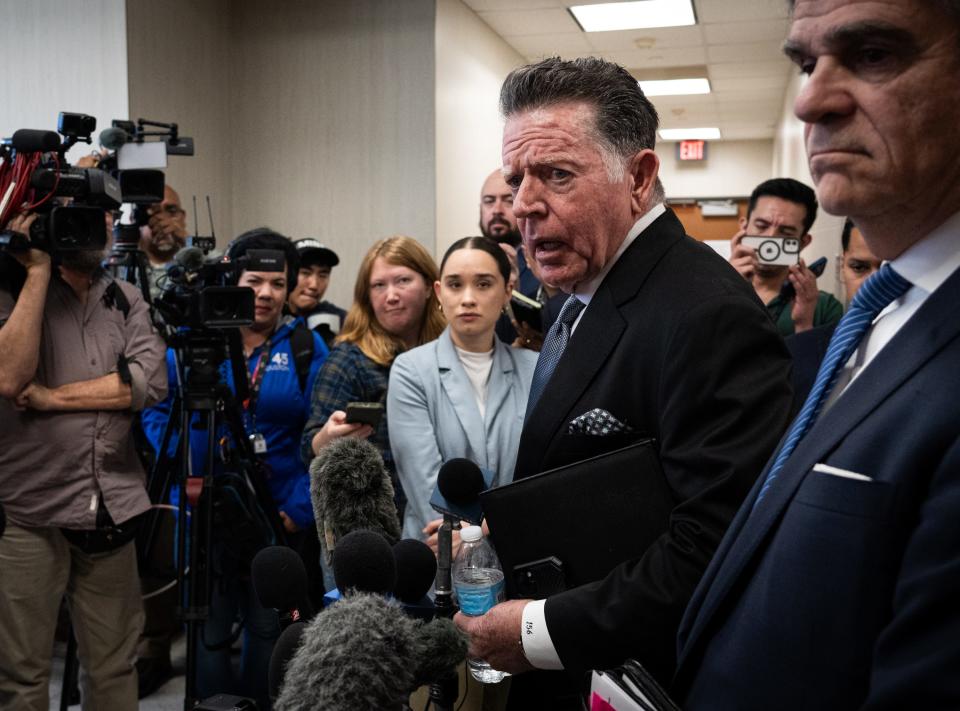AG Paxton continues fight against court-ordered deposition in latest filing with SCOTX
- Oops!Something went wrong.Please try again later.
Texas Attorney General Ken Paxton maintains that his sworn deposition is unnecessary in an ongoing dispute with four of his former top aides as he is already willing to concede to a final judgment in the case, according to a filing with the Texas Supreme Court made public Friday.
Paxton, who appealed to the state's highest civil court in January to quash a Travis County state District Court's order to mandate his deposition, argued that the lower court overextended its authority in requiring his testimony and the case should have already concluded.
"For all intents and purposes, as a legal dispute, the case was—or should have been—over," Paxton's office wrote in the June 5 filing before the state Supreme Court.

Previously, Paxton unsuccessfully moved to end the wrongful termination lawsuit, leading to his latest appeal, and asked that the Supreme Court either entirely overrule the order requiring his testimony or lessen the scope of the deposition to only focus on a future settlement agreement.
The dispute stems from a 2020 complaint that Paxton improperly fired four agency employees after they approached the FBI with concerns about Paxton's conduct and his relationship with campaign donor Nate Paul. Paxton has filed motions at all levels of the judiciary to avoid being deposed in the case and is again seeking the Supreme Court's intervention to stop his own deposition along with those of three of his top deputies.
Alongside complaints over his pending deposition, Paxton has argued that the whistleblowers are seeking retribution and political ammunition to help secure a future settlement that must be approved by the Legislature and that the case has become a waste of taxpayer time and money as no facts are under dispute.
More: AG Ken Paxton asks Texas Supreme Court to overturn election fraud reprimand against him
"Without any explanation about what facts remain to be proved, the trial court has accepted Plaintiffs’ argument that the judicial branch must allow the depositions of four of the senior-most executive officials at (the office of the attorney general), and then proceed to a trial, because a jury verdict might convince the Legislature to fund the judgment in 2025," Paxton's filing reads.
Earlier this year, the day before the Supreme Court accepted Paxton's appeal over the depositions, Travis County state District Judge Catherine Mauzy allowed the case to continue, siding with the whistleblowers' argument that Paxton shouldn't be allowed to accept a judgment while also maintaining his innocence.
"Those seem to me to be contradictory positions," Mauzy said at the time.
Paxton — along with First Assistant Attorney General Brent Webster; Paxton's chief of staff, Lesley French Henneke; and senior adviser Michelle Smith — had been scheduled to be deposed in February prior to the current appeal to the Supreme Court.
In their initial response to Paxton's latest appeal to the Supreme Court, attorneys for the whistleblowers defended the District Court decision to allow for unencumbered depositions of Paxton and his deputies and chided the attorney general for the "repugnant ploy" to prevent the testimony.
"The trial court did not abuse its discretion; it kept OAG from abusing the judicial system," the whistleblowers' attorneys wrote, referring to the Office of the Attorney General. "The court refused to endorse OAG’s disloyal scheme to orchestrate a judgment against the state of Texas just so the attorney general and a few of his close colleagues can avoid depositions."
An attorney for the whistleblowers declined to comment Friday on Paxton's most recent filing. Paxton's office did not respond to a request for comment.
More: For third year in a row, Nate Paul is Travis County's most delinquent taxpayer
A court brief from the whistleblowers' attorneys is due before the Supreme Court on June 25.
A previous, tentative $3.3 million agreement between Paxton and the whistleblowers failed in 2023 after Paxton asked for a legislative appropriation to fund the settlement, which prompted House Speaker Dade Phelan, R-Beaumont, to tap the House Committee on General Investigating to look into the situation.
Paxton was then impeached by the House in a broad bipartisan vote in a case that was built on many of the complaints voiced earlier by Paxton's hand-picked former deputies. Paxton was then acquitted last fall in a state Senate trial on the matter in September, placing him back in office.

During the primary election cycle, Paxton worked feverishly to unseat members who supported his impeachment, assisting in a successful offensive against several Republican incumbents and in the near defeat of Phelan, who was able to fend off a Paxton-backed challenger.
While the whistleblower lawsuit remains unresolved, Paxton was able to conclude his longest-running legal dispute earlier this year through a $271,000 restitution agreement to end a decadelong felony securities fraud case.
This article originally appeared on Austin American-Statesman: AG Paxton pushes Texas Supreme Court to nix court-ordered deposition

